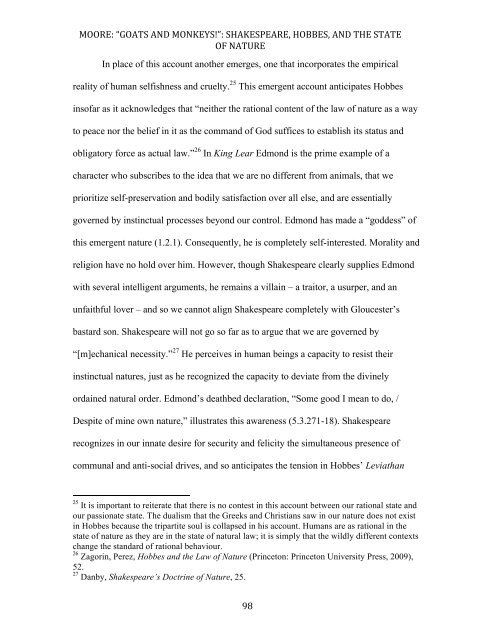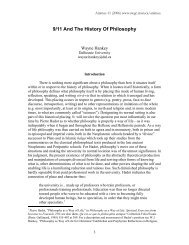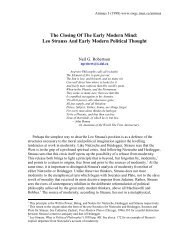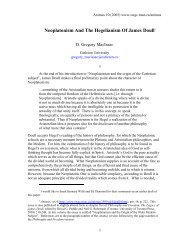âgoats and monkeys!â: shakespeare, hobbes, and the state of nature
âgoats and monkeys!â: shakespeare, hobbes, and the state of nature
âgoats and monkeys!â: shakespeare, hobbes, and the state of nature
Create successful ePaper yourself
Turn your PDF publications into a flip-book with our unique Google optimized e-Paper software.
MOORE: “GOATS AND MONKEYS!”: SHAKESPEARE, HOBBES, AND THE STATE <br />
OF NATURE <br />
In place <strong>of</strong> this account ano<strong>the</strong>r emerges, one that incorporates <strong>the</strong> empirical<br />
reality <strong>of</strong> human selfishness <strong>and</strong> cruelty. 25 This emergent account anticipates Hobbes<br />
ins<strong>of</strong>ar as it acknowledges that “nei<strong>the</strong>r <strong>the</strong> rational content <strong>of</strong> <strong>the</strong> law <strong>of</strong> <strong>nature</strong> as a way<br />
to peace nor <strong>the</strong> belief in it as <strong>the</strong> comm<strong>and</strong> <strong>of</strong> God suffices to establish its status <strong>and</strong><br />
obligatory force as actual law.” 26 In King Lear Edmond is <strong>the</strong> prime example <strong>of</strong> a<br />
character who subscribes to <strong>the</strong> idea that we are no different from animals, that we<br />
prioritize self-preservation <strong>and</strong> bodily satisfaction over all else, <strong>and</strong> are essentially<br />
governed by instinctual processes beyond our control. Edmond has made a “goddess” <strong>of</strong><br />
this emergent <strong>nature</strong> (1.2.1). Consequently, he is completely self-interested. Morality <strong>and</strong><br />
religion have no hold over him. However, though Shakespeare clearly supplies Edmond<br />
with several intelligent arguments, he remains a villain – a traitor, a usurper, <strong>and</strong> an<br />
unfaithful lover – <strong>and</strong> so we cannot align Shakespeare completely with Gloucester’s<br />
bastard son. Shakespeare will not go so far as to argue that we are governed by<br />
“[m]echanical necessity.” 27 He perceives in human beings a capacity to resist <strong>the</strong>ir<br />
instinctual <strong>nature</strong>s, just as he recognized <strong>the</strong> capacity to deviate from <strong>the</strong> divinely<br />
ordained natural order. Edmond’s deathbed declaration, “Some good I mean to do, /<br />
Despite <strong>of</strong> mine own <strong>nature</strong>,” illustrates this awareness (5.3.271-18). Shakespeare<br />
recognizes in our innate desire for security <strong>and</strong> felicity <strong>the</strong> simultaneous presence <strong>of</strong><br />
communal <strong>and</strong> anti-social drives, <strong>and</strong> so anticipates <strong>the</strong> tension in Hobbes’ Leviathan<br />
25 It is important to reiterate that <strong>the</strong>re is no contest in this account between our rational <strong>state</strong> <strong>and</strong><br />
our passionate <strong>state</strong>. The dualism that <strong>the</strong> Greeks <strong>and</strong> Christians saw in our <strong>nature</strong> does not exist<br />
in Hobbes because <strong>the</strong> tripartite soul is collapsed in his account. Humans are as rational in <strong>the</strong><br />
<strong>state</strong> <strong>of</strong> <strong>nature</strong> as <strong>the</strong>y are in <strong>the</strong> <strong>state</strong> <strong>of</strong> natural law; it is simply that <strong>the</strong> wildly different contexts<br />
change <strong>the</strong> st<strong>and</strong>ard <strong>of</strong> rational behaviour.<br />
26 Zagorin, Perez, Hobbes <strong>and</strong> <strong>the</strong> Law <strong>of</strong> Nature (Princeton: Princeton University Press, 2009),<br />
52.<br />
27 Danby, Shakespeare’s Doctrine <strong>of</strong> Nature, 25.<br />
98
















